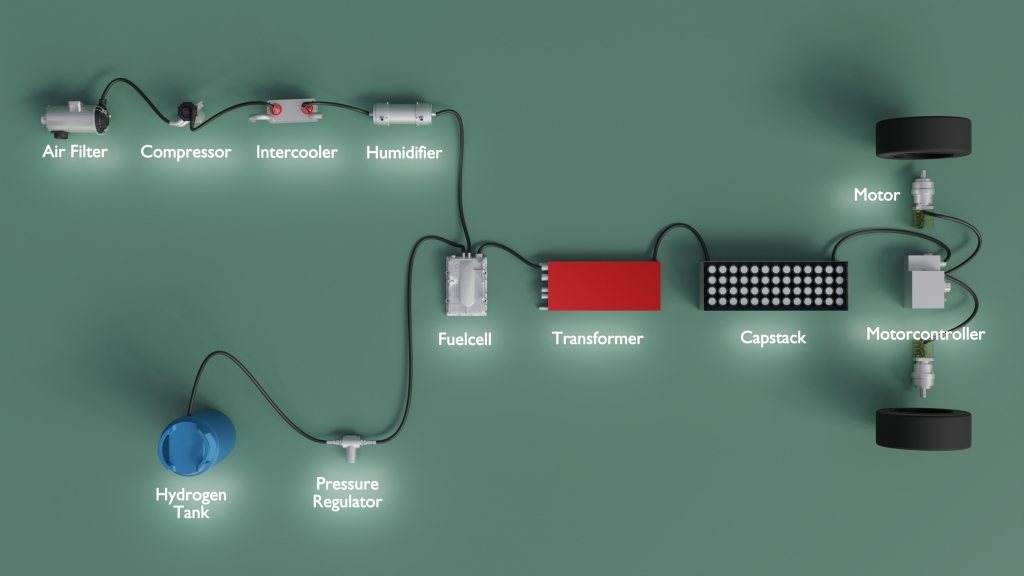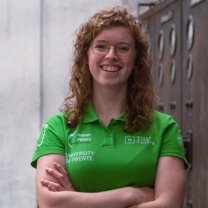A race car that runs on green hydrogen. This is what the students of Green Team Twente to demonstrate that hydrogen is also a good alternative to fossil fuels. The team is developing a car this year that can go up to speeds of one hundred kilometers per hour in five seconds. "Although that is an estimate," says Amber Peters, team manager of Green Team Twente. The team will be competing next summer in the Formula Student Race on the circuit in Assen and at Hockenheim in Germany.
Several teams within Green Team Twente are working on different parts of the race car. A hydro-electronic team is working on the hydrogen part as well as safety and controls. The mechanical team is focusing on cooling and the chassis, among other things. The construction of a hydrogen-powered race car already takes up enough time, Peters points out. "That's why we are using a hydrogen tank that is already on the market. When this is empty, we install a new one.”

Time to innovate
The first Green Team Twente launched a hydrogen-powered vehicle back in 2012. A vehicle that, above all, could be driven for as long as possible. The team won several awards from 2012 onwards, such as the Shell Eco-marathon and the Driver's World Championship along with several communication prizes.
The composition of the team changes each academic year. Students from the University of Twente and Saxion University take a gap year to fully focus on the project. Over ten years, dozens of students have gone on to refine the car's technology and extend its range. The car has now reached 992 kilometers.
"At some point it became a matter of a gram less on the bodywork, or a gram less on the chassis," says team manager Amber Peters, “so It was time to start innovating again." From there, last year's team charted a new course to compete in the Formula Student Race, an international race. "We are now building a real race car: how fast can you accelerate? How fast does the car go around corners? A totally new area for us.”
Garnering enthusiasm
So unique, in fact, that it does not have a racing class of its own yet. "We are so far ahead of the rest of Europe that there aren't even any other hydrogen race cars in our class yet." The team spent a large portion of last year trying to get other students enthusiastic about switching from racing electric cars to racing hydrogen ones.”
There are several student teams that already compete in electric racing. Going from electric to hydrogen is quite a leap, according to Peters. "Not only in terms of knowledge, but also in terms of budget. It takes a lot of time, a pool of people and energy to find companies that are willing to support you.”
Peters has noticed that companies are becoming gradually more and more enthusiastic. "They either express their interest during trade fairs or sign up as partners." Joining Green Team Twente are partners such as Rosen, VDL Energy Systems, and Royal Aerospace Center. The team has dozens of partners in a variety of categories. "Some partners invest monetarily, others with people power. Or we can take part in a course, or we can make use of their tools and equipment.”
One hundred percent
Peters joined the Green Team at the beginning of this academic year along with twenty-five other students. Peters completed her bachelor degree in Technical Medicine last summer. She felt that it was time to "learn something outside of my studies.”
"In Technical Medicine, I get to hold a lot of consultations with others. So, I can put those skills to good use now. Plus, I have a lot of conversations with team members. What are they doing exactly, what are they thinking? I also think it's really interesting to keep an overview of the various teams-we have several technical teams and a communications team -and to connect those team to each other." What particularly appealed to her was working together on a way to innovate and get the car up to the point it can participate in a race.
"It is such an enthusiastic team. Everyone is keen to share their knowledge with each other. If I just walk into the workshop to ask for an explanation, I end up spending fifteen minutes there. This enthusiasm is also evident at trade fairs. If I don't make any progress were the technology is concerned, then someone else will immediately take over and try something. Everyone is one hundred percent committed to getting that car to race.”
In a racing class of it’s own
technical aspects of the car. "They can use this info to draw up regulations so that independent people can be trained to do the technical inspection of the car during the competition.”
The team takes new steps each week, such as building a microphone into the helmet so that the driver can talk to the rest of their team. Or some components will come in for the cooling system, Peters goes on to say. The team will be racing the battery-powered version of the car in early November. "The hydrogen system will not have been developed far enough by then.”
The current Green Team is building on the knowledge of last year's team. Its supervisory and an advisory board includes former team members in addition to people from the University of Twente. "Everyone is still very much involved. Once the car is up and running and ready to race, I'm pretty sure that last year's team will come to watch.”
Dynamics
where four other student teams are also housed: Solar Boat, Electric Super Bike, Drone Team Twente and Robot Team Twente. "It's a really cool dynamic when you're at the workshop. One person is working on a robot, another on an engine. It looks like a pretty big mess at times, but definitely one with a structured kind of order," Peters says with a big smile.
Peters has weekly meetings with the other team managers. "How are they doing and what are they running up against? Or things like what do we should do with the building, or an event that we're organizing together. They are all teams that innovate in totally different areas, but it's really great that we are nevertheless connected with each other."




